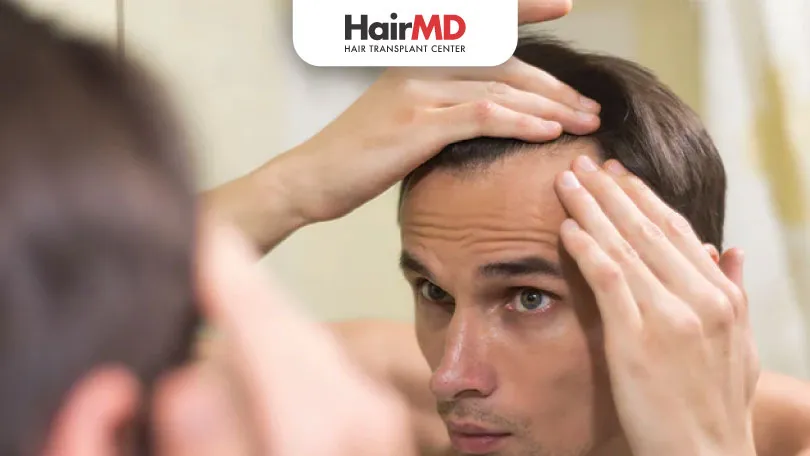11th May, 2023

Baldness is a concern many men and women face, and it can be quite upsetting, often affecting self-confidence. Losing hair can feel overwhelming, but the good news is that there are steps you can take to prevent or slow down hair loss.
In this article, we’ll explore simple, effective ways to keep your hair healthy and reduce the chances of baldness. Whether you’re starting to notice thinning or just want to maintain your locks, these tips can help both men and women protect their hair and boost their confidence.
What’s covered in the article?
- Understanding Baldness
- Tips for Preventing Baldness
- Lifestyle Changes
- Conclusion
Understanding Baldness
What Is Baldness?
Alopecia, or baldness, is the partial or full loss of hair on the scalp. It can happen for a variety of reasons, including genetics, hormone changes, and lifestyle choices.
Types of Baldness
Male Pattern Baldness (Androgenetic Alopecia): The most frequent kind of baldness in men, it is characterised by a receding hairline and crown thinning.
Female Pattern Baldness: Women can also experience pattern baldness, which typically involves thinning of hair on the top of the head.
Tips for Preventing Baldness
Maintain a Healthy Diet
A well-balanced diet plays a crucial role in hair health. Ensure that your meals include:
- Foods rich in protein, such as lean meats and legumes.
- Vitamins like A, C, and E, which promote hair growth.
- Iron and zinc are essential minerals.
Proper Hair Care
- Gentle Shampooing: To avoid damage to the hair shaft, avoid forceful scrubbing and use a light shampoo.
- Avoid Excessive Heat: Excessive use of hairdryers and styling appliances can cause hair damage.
- Regular Trimming: Trim your hair on a regular basis to avoid split ends and breakage.
Manage Stress
Stress can contribute to hair loss. Practice stress-reduction techniques like meditation, yoga, or deep breathing exercises to maintain your mental well-being.
Hormone Management
Hormonal imbalances can lead to baldness. Consult a healthcare professional to address any hormonal issues.
Medications and Treatments
Several medications and treatments are available to combat baldness. These include:
- Minoxidil: A topical solution that can stimulate hair growth.
- Finasteride: A prescription medication for male pattern baldness.
- Hair Transplants: Surgical procedures that relocate hair follicles.
Lifestyle Changes
- Quit Smoking: Smoking can contribute to hair loss. Quitting can improve your hair’s overall health.
- Limit Alcohol: Excessive alcohol consumption can weaken hair follicles. Moderation is key.
Protect Your Hair
When you’re outside, shield your hair from harsh weather conditions like direct sunlight or intense cold.
Stay Hydrated
Drink enough water every day to keep your hair and scalp moisturized and promote healthy hair development.
Baldness can be avoided with the appropriate lifestyle choices and preventive steps. You may encourage hair growth and prevent additional loss by eating a nutritious diet, using adequate hair care, reducing stress, and exploring medical treatments. Remember that individual results may vary, and it is critical to get tailored guidance from a healthcare practitioner.
Do You Know?
Nearly 250 Patients Visit HairMD
Everyday For Various Hair Concerns?
(Your journey to healthier and fuller hair starts here!)
Meet Our Dermatologists
Conclusion
In conclusion, baldness is a common issue that affects many people, but there are effective ways to prevent or slow its progression. By maintaining a healthy diet, managing stress, and taking proper care of your hair, you can support hair growth. If needed, medical treatments like medications or hair transplants are available At HairMD. Remember, everyone’s hair journey is different, so it’s important to seek personalized advice from a hair specialist.
Further Reading
पुरुषां मध्ये टक्कल पडण्याची कारणे व उपचार (Male Pattern Baldness)
पुरुषांमध्ये टक्कल पडण्याची कारणे आणि प्रभावी उपचार जाणून घ्या!
Why Men Experience Baldness: A Comprehensive Guide
Discover why men go bald and explore top reasons for hair loss. Learn effective management and treatment options for male hair loss.
Home Remedies vs. Specialist Treatments for Baldness: What Works Best?
Discover how Irinotecan affects hair loss, why it happens, and what you can do about it.
Understanding Female Pattern Baldness: Early Stage Causes and Solutions
Discover early causes & effective solutions for female pattern baldness in this guide!
Have thoughts? Please let us know
We are committed not only to treating you, but also educating you.











